Follow Your Different
330 The World’s Leading Alien Hunter: Harvard’s Top Astronomer Dr. Avi Loeb, Author of Interstellar
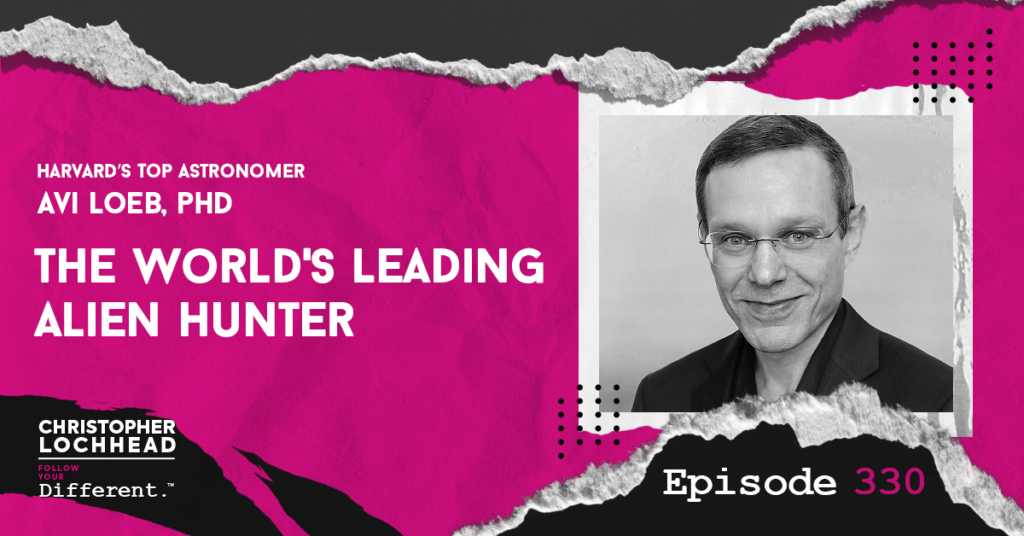
Podcast: Play in new window | Download (Duration: 1:28:31 — 60.8MB) | Embed
Subscribe: Apple Podcasts | Spotify | Pandora | RSS | More
On this episode of Christopher Lochhead: Follow Your Different, Dr. Avi Loeb makes a return to discuss why traditional science and academic circles still consider researching aliens as taboo. If you are not familiar with Dr. Avi Loeb and his work, you can check out our previous conversations with him (FYD 202 & FYD 230).
Dr. Avi Loeb is the most credential scientist and astronomer ever to say that we have been visited by something outside of our galaxy that is alien in nature. He also has a new book out called Interstellar: The Search for Extraterrestrial Life and Our Future in the Stars.
And now, Professor Loeb with his team are the first ever to discover and retrieve interstellar objects that landed on Earth. And even further, Professor Loeb says that he thinks there’s a case to be made that these remnants of these objects that came from outside of our solar system and landed in our ocean could be alien. So if you are interested in that and things from outside our earth, stay tuned to this episode.
You’re listening to Christopher Lochhead: Follow Your Different. We are the real dialogue podcast for people with a different mind. So get your mind in a different place, and hey ho, let’s go.
Dr. Avi Loeb and his Interstellar discovery
The conversation begins with Christopher expressing his admiration for Professor Loeb’s work and delves into the controversial nature of his recent actions. Professor Avi Loeb then talks about his expedition to Papua New Guinea and its connection to a significant interstellar discovery.
Professor Loeb explains that his journey to Papua New Guinea was prompted by the detection of a fast-moving object that collided with Earth in 2014. This object exhibited unusual properties, including its high speed and material strength. It was determined to have come from outside the solar system, which sparked initial skepticism among his colleagues but was later confirmed by the US Space Command.
To investigate further, Professor Loeb led an expedition to the Pacific Ocean, where the object had crashed. The team used a specialized sled with magnets to collect millimeter-sized particles from the ocean floor, which had rained down during the object’s explosion. After extensive searching, they found molten droplets and other materials that provided crucial insights into the object’s composition and origin.
Dr. Avi Loeb and the Spaceballs
Professor Avi Loeb then talks about the remarkable discovery of spaceballs, which are unusual spherical objects with unique compositions.
Professor Loeb also adds that the expedition was a significant effort funded by private donors, emphasizing the extensive work put into the project. He then talks about receiving the spaceball materials at his doorstep via FedEx, and he wasn’t concerned about a slight delay given the billions of years it took for the materials to arrive on Earth.
They then talk in detail about the analysis of these spaceballs, with Professor Loeb’s intern, Sophie Bertram, helping to discover and analyze a significant number of them. They found three high-yield regions along the meteor’s path, suggesting these regions might correspond to the flares observed during the meteor’s entry. The composition of these spaceballs, dubbed “Bilbao,” was unique, containing elements not found in known Earth, Moon, Mars, or asteroid materials. This composition further supports the idea that these materials originated from outside the solar system.
Dr. Avi Loeb on the skepticism of Traditional Science
Professor Loeb explains that initially, there was skepticism from some colleagues and reviewers when the data about these interstellar landings that occurred in 2014, leading to a delay in publishing the findings.
However, three years later, the US Space Command formally confirmed the object’s interstellar nature with a high level of confidence. This confirmation prompted Professor Loeb to plan an expedition to Papua New Guinea, gather a team, design specialized equipment, and secure funding.
During the expedition, they discovered unique materials known as “spaceballs” that didn’t resemble anything from the solar system. This discovery further supported the US Space Command’s assertion about the object’s interstellar origin.
Professor Loeb expresses frustration with astronomers who clung to traditional models and refused to revise them in light of new data, referring to it as the “Stone Age of Science.” He highlights the importance of adjusting models when they don’t align with observed data.
To hear more from Dr. Avi Loeb and his interstellar discoveries, download and listen to this episode.
Bio
“The world’s leading alien hunter”—New York Times Magazine
Dr. Abraham (Avi) Loeb is the Frank B. Baird, Jr., Professor of Science at Harvard University.
He received a Ph.D. in Physics from the Hebrew University of Jerusalem in Israel at age 24 (1980-1986), led the first international project supported by the Strategic Defense Initiative (1983-1988), and was subsequently a long-term member of the Institute for Advanced Study at Princeton (1988-1993).
Loeb has written 8 books. These includes most recently, Extraterrestrial (Houghton Mifflin Harcourt, 2021), and about 800 papers (with an h-index of 113) on a wide range of topics. Topics include black holes, the first stars, the search for extraterrestrial life and the future of the Universe.
He had been the longest-serving Chair of Harvard’s Department of Astronomy (2011-2020), Founding Director of Harvard’s Black Hole Initiative (2016-present), and Director of the Institute for Theory and Computation (2007-present) within the Harvard-Smithsonian Center for Astrophysics.
He is the Chair of the Board on Physics and Astronomy of the National Academies (2018-present). Additionally, he is also an elected fellow of the American Academy of Arts & Sciences, the American Physical Society, and the International Academy of Astronautics.
Loeb is a member of the President’s Council of Advisors on Science and Technology (PCAST) at the White House and a member of the Advisory Board for “Einstein: Visualize the Impossible” of the Hebrew University.
He also chairs the Advisory Committee for the Breakthrough Starshot Initiative (2016-present). Further, he serves as the Science Theory Director for all Initiatives of the Breakthrough Prize Foundation.
In 2012, TIME magazine selected Loeb as one of the 25 most influential people in space. In 2020 Loeb was selected among the 14 most inspiring Israelis of the last decade.
Click here for Loeb’s commentaries on innovation and diversity.
Links
Learn more about Dr. Avi Loeb!
Harvard | Harvard.edu | Wikipedia | Science Today
Amazon Books – Extraterrestrial: The First Sign of Intelligent Life Beyond Earth
Amazon Books – Interstellar: The Search for Extraterrestrial Life and Our Future in the Stars
Harper Collins – Interstellar: The Search for Extraterrestrial Life and Our Future in the Stars
We hope you enjoyed this episode of Christopher Lochhead: Follow Your Different™! Christopher loves hearing from his listeners. Feel free to email him, connect on Facebook, Twitter, Instagram, and subscribe on iTunes
329 The Power of Words with Dr. Valerie Fridland, #1 Bestselling Author of “Like, Literally, Dude”
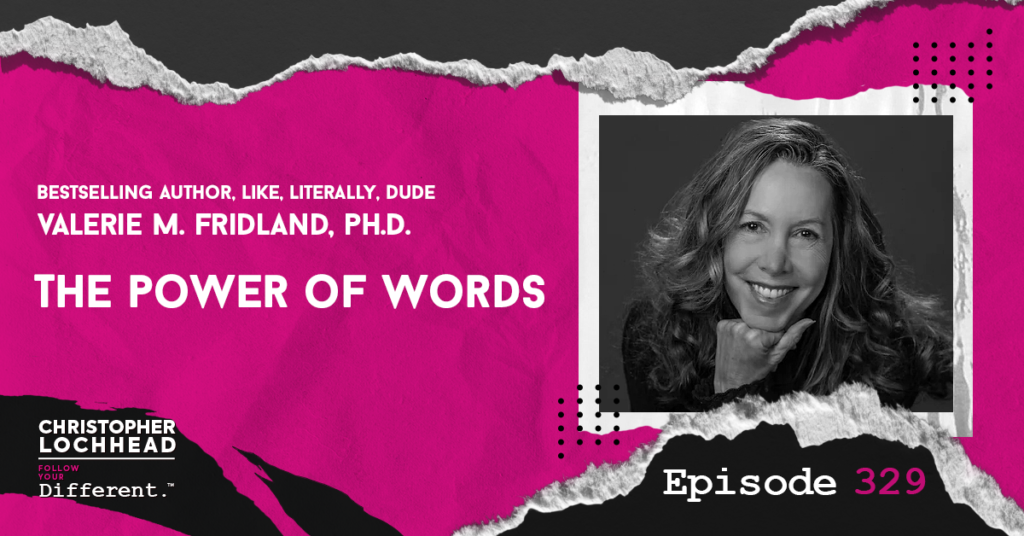
Podcast: Play in new window | Download (Duration: 1:08:03 — 46.7MB) | Embed
Subscribe: Apple Podcasts | Spotify | Pandora | RSS | More
Nothing is more powerful than words. Yet we seldom realize that our most private thoughts and emotions are not actually our own. For we think in terms of languages and images, which we did not invent, but which were given to us by our society. Today, we go deep into the power of words and much more with our guest, Dr. Valerie Fridland.
Dr. Valerie Fridland is a professor of linguistics at the University of Nevada in Reno. She writes a popular language blog on psychology today called Language in the Wild. Her new book is the number one bestseller. It’s called, Like, Literally, Dude, arguing for the good in bad English. So if you love words, thinking, and thinking about words, you’re gonna love Dr. Valerie.
You’re listening to Christopher Lochhead: Follow Your Different. We are the real dialogue podcast for people with a different mind. So get your mind in a different place, and hey ho, let’s go.
Dr. Valerie Fridland on how Language evolves over time
The conversation starts with Christopher asking if the emergence of new phrases that some people dislike is a part of how language changes and develops. Dr. Valerie Fridland explains that language evolution involves a combination of factors, including how our brains and mouths work, societal influences, and the goal of maximizing communication with minimal effort. Language not only conveys information but also communicates social facts and signals about relationships and context.
Dr. Valerie mentions that language naturally tends to become more efficient in terms of pronunciation over time. For instance, sounds that are harder to articulate tend to simplify, such as the evolution of “th” sounds into sounds like “f” or “v.” Despite these natural linguistic changes, people often criticize them as lazy or uneducated.
Christopher shares examples of pronunciation differences he’s noticed over time, like the word “details” and “insurance”. Dr. Valerie explains that these changes often involve shifts in stress patterns, where certain syllables become emphasized while others are de-stressed. This shift in stress patterns can be influenced by various factors, including the influence of other languages or dialects.
The shifting of words due to culture and society
Dr. Valerie and Christopher then continue the discussion about the shift of words due to cultural and contextual changes over time. They explore the evolution of the word “stone” from its Old English origins as “stainaz” to its modern form, which was influenced by contact with Old Norse and Anglo Norman French. This emphasizes how language changes in response to historical interactions and influences.
They also discuss the evolution of the word “partner” and how it reflects changes in societal attitudes towards relationships. Initially associated with business partnerships, “partner” expanded to include romantic or committed relationships, especially within the LGBTQ+ community as social acceptance grew. Younger generations commonly use “partner” to refer to their significant others, regardless of their gender or marital status. Valerie explains that language adapts to describe new concepts or changing social norms, often by repurposing existing words rather than creating entirely new ones.
Dr. Valerie Fridland on Neologism
Neologism refers to the creation of entirely new words, not borrowed from other languages. Christopher initially confuses neologism with someone who invents new words, but Dr. Valerie Fridland clarifies that it involves creating completely new words.
They discuss examples related to language innovation. Christopher mentions how businesses like Starbucks introduce new words or repurpose existing ones to create new categories, as seen with “latte” and “grande.” Valerie explains that these are not neologisms but rather the borrowing or repurposing of words.
The conversation delves into the concept of creating new words through morphological processes like adding suffixes, as seen with “palooza” and “gate.” These processes involve attaching meaningful elements to existing roots, creating new words that build on old word parts.
Christopher provides an example of how he playfully tweaks expressions to make them more accurate, such as saying “to make a long story longer” instead of the common “to make a long story short.” Dr. Valerie describes this as a form of linguistic extravagance, where novelty and unexpected language use attract attention and cognitive focus.
To hear more from Dr. Valerie Fridland and the power of words in our culture and society, download and listen to this episode.
Bio
Valerie M. Fridland, Ph.D.
Sociolinguist, Professor, Author
With a PhD in linguistics, Dr. Valerie Fridland is a Professor and former Director of Graduate Studies in the Department of English at the University of Nevada in Reno. An expert on the relationship between language and society, her work has appeared in numerous academic journals and she is co-author of the book Sociophonetics.
Dr. Valerie also speaks and writes widely for a popular audience. Her language blog, Language in the Wild, appears in Psychology Today and her lecture series, Language and Society, is featured with The Great Courses. Her first book for a popular audience, Like, Literally, Dude: Arguing for the Good in Bad English, is available for pre-order with Viking/Penguin Press. She has appeared as a language expert on a variety of media outlets such as CBS News, NPR and Newsy’s The Why and is regularly featured on podcasts and radio.
Dr. Valerie Fridland lives with her husband and two teenagers in the beautiful Reno/Tahoe area.
Links
Connect with Dr. Valerie Fridland!
Dr. Valerie’s website | LinkedIn | Language in the Wild | Like, Literally, Dude
We hope you enjoyed this episode of Christopher Lochhead: Follow Your Different™! Christopher loves hearing from his listeners. Feel free to email him, connect on Facebook, Twitter, Instagram, and subscribe on iTunes!
328 Crime, Justice, & America with Morgan Wright & Steve Murphy, Hosts of The Game of Crimes Podcast
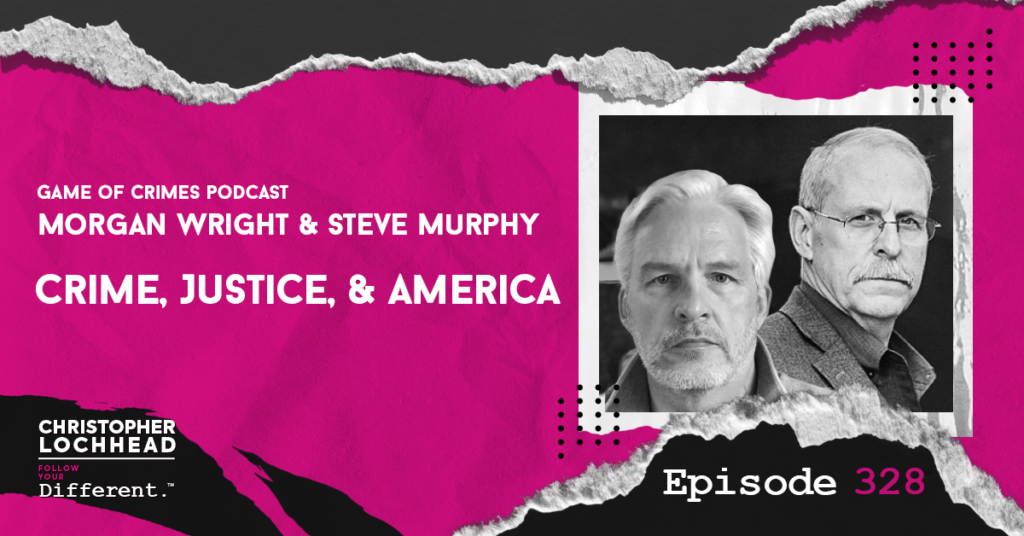
Podcast: Play in new window | Download (Duration: 1:30:22 — 62.1MB) | Embed
Subscribe: Apple Podcasts | Spotify | Pandora | RSS | More
On this episode of Christopher Lochhead: Follow Your Different, we have a riveting dialogue with two of America’s favorite crime fighters. The hosts of the Game of Crimes Podcast are here: Morgan Wright and Steve Murphy.
Steve Murphy was one of the real DEA Narcos who took down Pablo Escobar. The Netflix series Narcos is based on his work.
Morgan Wright spent 18 years in state and local law enforcement is a highly decorated police officers state trooper and detective. He was even trained by the original members of the FBI as Behavioral Science Unit on serial crime profiling, which led him to training spies and spooks at places like the NSA.
If you’re a crime buff care about justice and or care about the future of the United States, you’re going to love this episode.
You’re listening to Christopher Lochhead: Follow Your Different. We are the real dialogue podcast for people with a different mind. So get your mind in a different place, and hey ho, let’s go.
How Gangs are extending their Influence in certain parts of America
The conversation starts off with Steve Murphy sharing shocking revelations about Mexican gangs and their influence on California laws. He mentions their podcast called “Game of Crimes”, which has been running for over two years, and their recent episode about an interview with a former member of the Mexican Mafia, referred to as “Mundo.” They emphasize not sharing his real name due to safety concerns, as there is a history of violence associated with such revelations.
Steve explains further how criminal groups like the Mexican Mafia manipulate the California penal system and legislators. They work to secure more lenient laws, better prison conditions including improved food, reduced responsibilities, and access to phones for conducting criminal activities from behind bars. The speaker expresses how these criminals mock the California legislators, exploiting their reluctance to confront them, resulting in laws that favor the criminals. This situation is portrayed as detrimental to honest taxpayers in California, who end up losing out.
On Gangs using children in their operations
The conversation continues as they discuss the disturbing trend of gangs involving children in their criminal operations, particularly in relation to Mexican fentanyl gangs and trafficking. Christopher expresses his shock about the leniency of consequences for minors involved in serious crimes due to certain laws in California. He describes a conversation with a police chief who shared a case of a 14 or 15-year-old who stabbed a rival gang member and received only a three-month ankle bracelet as punishment.
They then delve into the concept of gangs using children, mentioning how historically even New York City drug dealers employed young kids as lookouts. Steve Murphy shares insights into the psychology of recruitment, explaining how gangs exploit children’s need for attention and affection, particularly in impoverished neighborhoods where parental support may be lacking, and the allure of earning “easy money” even as a child. This dynamic leads to these kids being drawn into gang activities.
Morgan Wright adds that Mexican fentanyl gangs are trafficking even children, who are forced into various criminal roles such as drug distribution, human trafficking, and even employment. He highlights the shift in focus for cartels from drug trafficking to human trafficking due to the increased profits and lower risks involved. The term “Minutemen” is mentioned, referencing how quickly kids are released from custody due to relaxed laws, allowing gangs to maintain control over them easily.
Keeping children out of jail
Morgan Wright then stresses how important it is to keep children out of the streets and jails, so they do not fall further into the machinations of these gangs.
“The intervention has to start early and often because if you don’t, they’ll arrive at a path to where as he could either stay on the good side, or he could go to the other side. And it’s that age around 12 or 13 is the one of the most critical times for a kid.”
– Morgan Wright
He says that once these kids start getting involved in gangs, it’s like a rabbit hole that sucks them in deeper, and it’ll be harder to get them out later on. You’ll not only be fighting the gangs, but also these young adults as well, because now they think that’s the only thing they can do with their life.
To hear more from Morgan Wright and Steve Murphy and the current state of Crimes and Justice in America, download and listen to this episode.
Bio
Morgan Wright
Morgan spent 18 years in state and local law enforcement as a highly decorated police officer, state trooper and detective.
He solved a lot of cases, interviewed a lot people, and interrogated a bunch of suspects.
In fact, he was trained by the original members of the FBI’s Behavioral Science Unit on serial crime profiling.
This led to him training spies and spooks at places like the NSA.
Morgan’s sister once accused him of being a spy because he was spending a lot of time in foreign countries like Pakistan, Turkey, Colombia and the Middle East.
To this day, Morgan denies that accusation, saying “You can’t prove it…so there.”
He continues to do a LOT of stuff on television talking about cyberterrorism and other things Murph doesn’t understand.
Morgan is the co-host of The Game of Crimes Podcast.
Steve Murphy
Yes, he and Javier Pena helped catch Pablo Escobar. So he’s got that going for him.
Netflix made a big deal out of it and created one of the most successful series ever called “Narcos”.
The scenes where Steve looks good are all true according to…Steve.
During his long career he helped bring down dangerous drug traffickers, dismantled criminal organizations, and worked with state and local law enforcement to go after the worst of the worst.
Their bestselling book “Manhunters: How We Took Down Pablo Escobar” is a must-read for anyone who wants to know what it takes to bring down the world’s first narcoterrorist.
When Steve isn’t podcasting or getting lost driving around town, he and Javier are traveling the globe doing live presentations. Check them out at DEA Narcos.
Steve is also the co-host of The Game of Crimes Podcast.
Links
Connect with Steve Murphy and Morgan Wright
LinkedIn: Morgan Wright | LinkedIn: Steve Murphy | DEA Narcos
The Game of Crimes Podcast | Manhunters: How We Took Down Pablo Escobar
We hope you enjoyed this episode of Christopher Lochhead: Follow Your Different™! Christopher loves hearing from his listeners. Feel free to email him, connect on Facebook, Twitter, Instagram, and subscribe on iTunes!
327 Queer In The C-Suite with Jim Fielding, Bestselling Author of All Pride No Ego: A Queer Executive’s Journey to Living and Leading Authentically
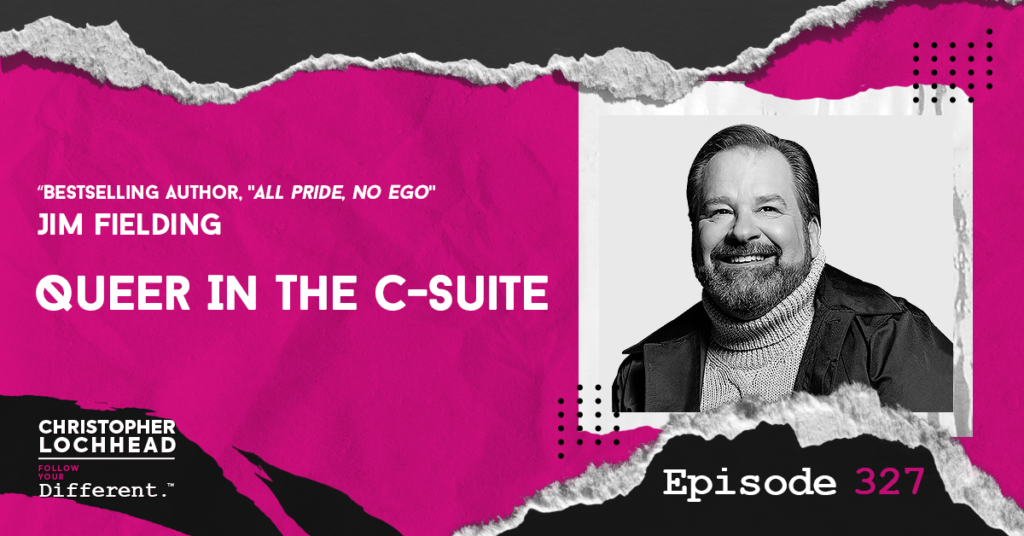
Podcast: Play in new window | Download (Duration: 1:38:32 — 67.7MB) | Embed
Subscribe: Apple Podcasts | Spotify | Pandora | RSS | More
Many of us are different; and for many of us being different is a superpower. But what do you do if your different is not always accepted in the business world? How can you use your different as an advantage? We get into that and much more with our guest, Jim Fielding.
Jim Fielding has had an extraordinary executive career, working at the highest levels of some of the most well-known and respected corporations in the world companies like The Gap, Disney, DreamWorks, and 20th Century Fox. And Jim’s got a stunning new book out. It’s called All Pride, No Ego: A queer executive’s journey to living and leading authentically.
Today, we get into all of it: from how to have a legendary career as an openly gay man and how to be different. We also dig into many of the thorny social dynamics that are being discussed and dealt with right now around the LGBTQ+ community in modern America.
You’re listening to Christopher Lochhead: Follow Your Different. We are the real dialogue podcast for people with a different mind. So get your mind in a different place, and hey ho, let’s go.
Jim Fielding on being Different and having the Freedom to follow it
The conversation starts off with Jim’s younger years, as he reveals that he felt different around the age of six or seven and had a sense of destiny beyond his hometown.
He grew up in Toledo, Ohio, near Lake Erie, and had a middle-class upbringing with a firefighter father and stay-at-home mom. But he has always felt that his parents gave him a sense of freedom early on.
Jim’s book, which was initially meant for 2024, has taken on more urgency amid the evolving LGBTQ+ rights movement. He shares how it has evolved into a platform for conversations, community building, and addressing inequities. They then talk about the impact of the book and how Jim is using his platform to advocate for marginalized communities and human rights.
Jim Fielding on the state of queer communities then and now
They then talk about the state of queer communities over the years. Jim Fielding discusses the evolution of attitudes towards LGBTQ+ individuals and their experiences.
Jim reflects on the changing landscape and the challenges faced by the queer community. He notes that the current situation feels like a mix of progress and regression, with moments of hope interspersed with concerning headlines about anti-LGBTQ legislation and discrimination. Jim emphasizes the need to own the narrative and stand up against efforts to push the community back into the closet. He draws parallels to historical moments, such as the fight for rights in the 1960s and the AIDS crisis in the 1980s.
Despite all these, Jim’s optimism remains strong, bolstered by the resilience of the queer community and the activism of younger generations.
On standing up and being an Ally
The conversation then shifts to Christopher’s perspective as an ally and his observations about changing attitudes. He contrasts the comparatively accepting atmosphere of the 1970s and 1980s, exemplified by cultural icons like David Bowie and Annie Lennox, with the challenges faced during the AIDS epidemic and subsequent backlash. He expresses confusion about the shifts in attitudes and experiences, wondering if his memories of acceptance were naive or if there has been a recent shift.
Jim offers insights into the impact of the AIDS epidemic on perceptions of the LGBTQ+ community and the subsequent challenges it faced. He discusses how this period led to a more pronounced demonization of LGBTQ+ individuals, especially by conservative groups. They also touch on the struggle for marriage equality and the ongoing fight for LGBTQ+ rights.
Bio
Jim Fielding, a proud Ohio native and Indiana University Hoosier, started his career on the department store floor.
Over the next 30 years, he would lead some of the world’s most beloved media and retail brands, including The Gap, Disney, Claire’s, Dreamworks, and 20th Century Fox.
Jim is known for his ability to combine storytelling and product merchandising into unforgettable consumer experiences. As culture builder and talent spotter, he has recruited and trained global leaders in a variety of disciplines and at all levels.
Today, Jim spends his time and talents on independent media, entrepreneurship, higher education, and philanthropy.
He’s a Partner at Archer Gray, an independent media company inspiring change through storytelling and innovative brand collaborations.
Jim is also the founder of the boutique consultancy, Intersected Stories, and proudly serves as part-time Executive-In-Residence for IU Ventures and The Office of Diversity, Equity, and Inclusion.
He is also an active angel investor and advisor to early-stage startups and their founders.
Jim has been active in philanthropy for over 25 years, serving on the boards of charitable organizations like Make-A-Wish, GLSEN, Kidspace Children’s Museum, and the American Red Cross.
He was recognized by the Walt Disney Company as Executive Volunteer of the year in 2011.
More recently, Jim has become a vocal advocate for LGBTQ+ rights and social justice.
Jim currently lives in Atlanta, Georgia with his partner, Joseph, and their dogs, Cricket and Olive. In the summers, you will find him lounging lakeside in Northern Michigan.
Links
Connect with Jim Fielding!
Archer Gray | LinkedIn | Instagram | All Pride, No Ego | More about Jim
We hope you enjoyed this episode of Christopher Lochhead: Follow Your Different™! Christopher loves hearing from his listeners. Feel free to email him, connect on Facebook, Twitter, Instagram, and subscribe on iTunes!
326 The Well-Lived Life with 102-year-old Dr. Gladys McGarey, “Mother of Holistic Medicine” & Bestselling Author
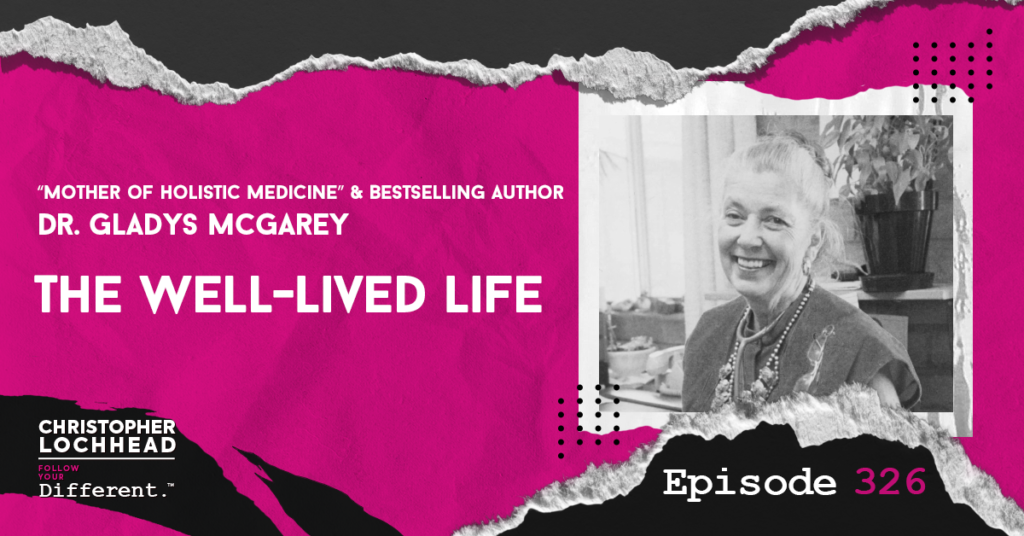
Podcast: Play in new window | Download (Duration: 1:13:48 — 50.7MB) | Embed
Subscribe: Apple Podcasts | Spotify | Pandora | RSS | More
We all want to live life well and long but oftentimes, life gets in the way of having a legendary life. But what if there are secrets to a well lived life? Today, we have a life affirming real dialogue with the legendary Dr. Gladys McGarey.
Dr. Gladys McGarey is a general practitioner, co-founder of the American Holistic Medical Association, and she’s a category designer who is considered the mother of holistic medicine.
Dr. Gladys is 102 years old; she began her medical practice at a time when women couldn’t even have their own bank accounts. She’s got a new number one best seller out and it’s already in its second printing, called The Well Lived Life, a 102-year-old doctors six secrets to health and happiness at every age. This conversation takes some fascinating and unexpected turns, and we hope you join us for it.
You’re listening to Christopher Lochhead: Follow Your Different. We are the real dialogue podcast for people with a different mind. So get your mind in a different place, and hey ho, let’s go.
Dr. Gladys McGarey on the Importance on focusing on Life and Love
We start the conversation with Dr. Gladys, who is more than 100 years old, and they discuss how amazing it is to communicate through modern technology.
Dr. Gladys expresses her conflicted views on technology’s impact, suggesting that the lack of real-life experiences and love in young people’s lives might contribute to violence.
She then shares a story about using dogs in the classroom to provide children with a sense of real love, which could prevent harmful behaviors. She also talks about the power of animals to bring joy and love, and how Dr. Gladys’ upbringing in India reinforced the importance of love in healing and how it is a powerful medicine, as described in Dr. Gladys’ book.
Dr. Gladys McGarey on how to make do with what you have
Dr. Gladys discusses the benefits of modern technology, as well as acknowledge some concerns that herself has. She reflects on her medical career, recognizing the limitations of past practices and the importance of evolving with new knowledge.
She shares a dream that led to the realization of the interconnectedness of masculine and feminine energies. They explore the concept of feminine gestation and manifestation, emphasizing the need to understand and appreciate this process in addition to traditional manifestations. Dr. Gladys suggests that acknowledging and accepting this holistic approach could lead to better outcomes, instead of rejecting them outright.
Find her Voice in her 90s
In her 90s, Dr. Gladys had a breakthrough in finding her voice and embracing her true humanity.
She had always sought validation from others and struggled to trust her own voice. Through a dream, she had a profound realization that her voice mattered and was essential to express her soul essence. This led her to write a book with a deeper focus on the inner aspect of the Divine, emphasizing life and love.
She believes that as humans, we are reaching for our true humanity, understanding the importance of caring for each other and the Earth rather than seeking dominance. Dr. Gladys sees simplicity in embracing life and love as essential elements of our existence.
To hear more from Dr. Gladys McGarey and her views on how to live a fulfilled life, download and listen to this episode.
Bio
Dr. Gladys McGarey is 102 years old in 2023, at the time of the publication of her book “The Well-Lived Life: A 102-Year-Old Doctor’s Six Secrets to Health and Happiness at Every Age”
Dr. Gladys is also still a consulting doctor.
Recognized as a pioneer of the allopathic and holistic medical movements, she is also a founding diplomat of the American Board of Holistic Medicine.
She is the cofounder and past president of the American Holistic Medical Association, as well as the cofounder of the Academy of Parapsychology and Medicine and the founder of The International Academy of Clinical Hypnosis.
Dr. Gladys lives and works in Scottsdale, Arizona, where for many years she shared a medical practice with her daughter.
She currently has a medical consulting practice, maintains a healthy diet, and enjoys a good piece of cake every now and then.
Links
Connect with Dr. Gladys McGarey!
Dr. Gladys’ Website | The Well-Lived Life | More info on Dr. Gladys
We hope you enjoyed this episode of Christopher Lochhead: Follow Your Different™! Christopher loves hearing from his listeners. Feel free to email him, connect on Facebook, Twitter, Instagram, and subscribe on iTunes!
325 Finding Meaningful Work in a Post-Career World with Bruce Feiler, 7-time NYT Bestselling Author
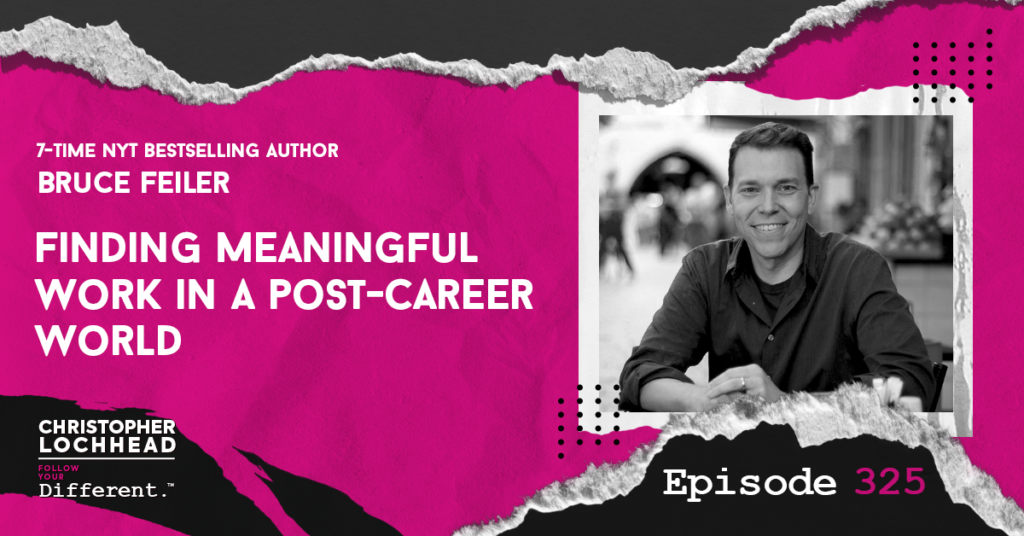
Podcast: Play in new window | Download (Duration: 1:21:12 — 55.8MB) | Embed
Subscribe: Apple Podcasts | Spotify | Pandora | RSS | More
The people who are happiest don’t chase someone else’s dreams; they chase their own. This is according to our guest, one of our favorite authors, thinkers, and people, Bruce Feiler. So we have a whole dialog on just that.
Bruce Feiler is the author of the landmark book, Life is in the Transitions. And now he’s back to address one of the seminal questions of our time: “How do we find or create meaningful work,” a subject he’s lived over and over again. His new book is out and it’s called The Search, finding meaningful work in a post career world.
Bruce is one of America’s most thoughtful voices on contemporary life. He’s a seven-time New York Times bestselling author, he’s lived many lives from circus clown to preeminent spirituality, author to winning three James Beard Awards and being the subject of a Jeopardy question. Bruce is an American treasure, who you’re going to love hanging out with.
You’re listening to Christopher Lochhead: Follow Your Different. We are the real dialogue podcast for people with a different mind. So get your mind in a different place, and hey ho, let’s go.
Bruce Feiler and his book’s effect
One of Bruce’s books is titled “Life is in the Transitions,” which explores the idea that nearly half of our lives are spent in various transitions. The book delves into personal experiences, including Bruce’s own life upheavals, such as battling cancer, facing financial troubles, and dealing with family crises. He explains how society tends to undervalue and stigmatize these transitional periods while glorifying stability.
Bruce’s mission is to normalize and understand the growth potential in these unsettled phases, encouraging people to embrace them as opportunities for renewal and transformation. The book has resonated with readers who recognize and appreciate the validation it provides for the complex emotions and experiences they encounter during life’s transitions.
Bruce Feiler on the notable lack of life transition books at 40
When asked why he thinks there’s not a lot of books like his on the shelves, Bruce shares that it was mainly because society has traditionally undervalued and stigmatized these periods. The focus has been on achieving stability and success, neglecting the importance of understanding and embracing life’s transitions.
However, Bruce says that recent societal changes, including the decline of organized religion and shifts in the workforce, have led to a growing interest in searching for meaning in life and work. People are no longer content with viewing work as a mere source of income but are seeking work with purpose and significance.
This shift in perspective has sparked a renewed interest in exploring life transitions and finding meaning in these transformative phases, especially for professionals who are still pursuing their careers in their 40s and beyond.
The power of work vs fame
The conversation then shifts to the power of work over fame, and the importance of focusing on the craft rather than seeking balance. Bruce praises the Christopher’s diverse and successful career and emphasizes that legendary individuals are not known for balance.
For Christopher, he finds Bruce’s commitment to the work quite amazing, and despite achieving fame and success, he remains grounded and humble. Bruce attributes his continued passion and joy to finding a path that aligns with his talents. They agree that the best work comes from dedicated effort and stepping away from distractions to focus on the creative process.
To hear more from Bruce Feiler and how to make the most out of yourself during your transitions, download and listen to this episode.
Bio
Links
Connect with Bruce Feiler!
Bruce’s Website | Twitter | LinkTree
We hope you enjoyed this episode of Christopher Lochhead: Follow Your Different™! Christopher loves hearing from his listeners. Feel free to email him, connect on Facebook, Twitter, Instagram, and subscribe on iTunes!
324 Peak Performance Aging with Steven Kotler, NYTimes bestselling author of Gnar Country
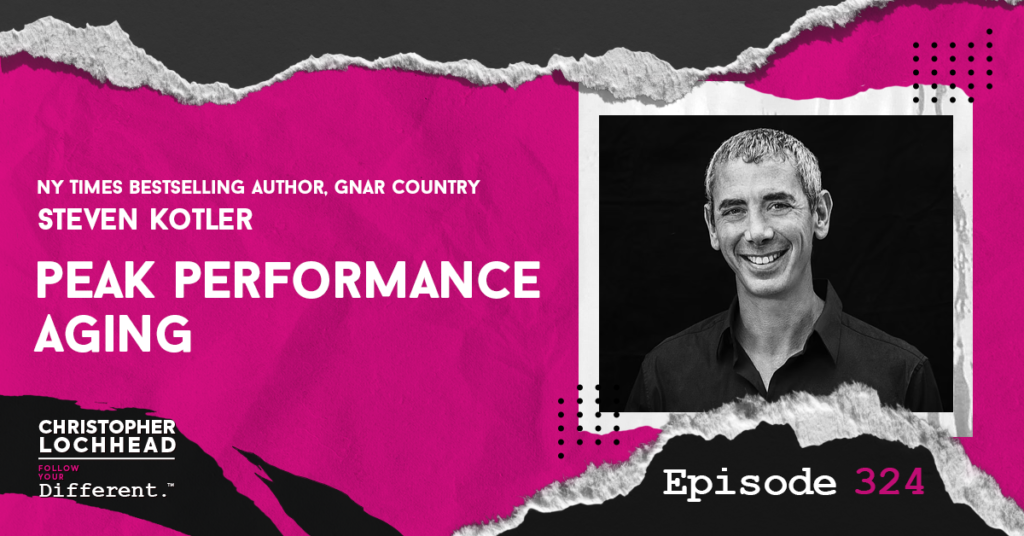
Podcast: Play in new window | Download (Duration: 1:10:08 — 48.2MB) | Embed
Subscribe: Apple Podcasts | Spotify | Pandora | RSS | More
The story we’ve been told our entire lives is that as we get older, we decline physically. But what if we could become more legendary as we age? We discuss this and so much more with our legendary guest, Steven Kotler.
Science-based Human Performance Guru Steven Kotler is back in his fantastic new book Gnar Country: Growing old, Staying Rad. Steven lays out how cutting-edge discoveries in embodied cognition flow science, and network neuroscience have revolutionized how we think about peak performance aging.
In this radically different conversation, you’ll learn how to embrace peak performance aging in your life. This is a fun, fascinating and deeply insightful conversation with one of our favorite thinkers.
You’re listening to Christopher Lochhead: Follow Your Different. We are the real dialogue podcast for people with a different mind. So get your mind in a different place, and hey ho, let’s go.
Steven Kotler writes a book about me
The conversation starts off about the new book that Steven has written, called Gnar Country. Christopher expresses his gratitude to Steven for writing the book and acknowledges his admiration and respect for him. However, Christopher also tells Steven that it has challenged his comfortable outlook on life.
The book centers around the idea of not being “dead before you’re dead,” encouraging readers to embrace mission-style challenges in the second half of their lives. Steven clarifies that he doesn’t mean Christopher has to go surf Mavericks, a famous surfing spot known for its enormous waves. But rather that engaging in difficult and fulfilling activities can be transformative. For Steven, the second half of life is presented as an opportunity for growth and exploration.
Getting back to Gnar Country
Christopher, who had been easing into a more relaxed lifestyle, confesses that he was getting used to being “dead” in a figurative sense – finding comfort in smoking at home, enjoying the garden, and taking leisurely walks. However, after reading Steven’s book, he feels inspired and reminded of the adventures he used to embark on with his friend Al Ramadan. Christopher mentions how he and Al would take annual trips for adrenaline-fueled activities like surfing, skiing, and scuba diving.
Coincidentally, as Christopher reads the book, he receives an email from Al Ramadan, proposing a future surf and dive trip for their group of friends. This timing strengthens Christopher’s belief that the universe, through Steven and Al, is nudging him to return to thrilling and challenging adventures in “Gnar country”.
Steven Kotler on Park Skiing in your 50s
The conversation then focuses on Steven Kotler’s experience of teaching himself park skiing at the age of 50. This is despite conventional beliefs that learning such skills becomes impossible after a certain age. Steven explains that there has been scientific research done in the past 20-25 years that challenges the traditional view of aging, which assumes a gradual decline in physical and mental abilities. He emphasizes the “use it or lose it” principle, stating that with continued training and practice, individuals can maintain their skills far longer than previously thought.
As a skier himself, Christopher initially finds it incredulous that Steven attempted to learn park skiing in his 50s. He recounts a personal experience of attempting a park maneuver in his early 40s and how risky it was as he continued. Christopher expresses his surprise at Steven’s determination and adventurous spirit, acknowledging the challenges and potential dangers associated with park skiing.
This further showcase Steven’s pursuit of pushing boundaries and defying age-related limitations by taking on the challenge of park skiing in his 50s, which is pretty rad, in our opinion.
To hear more from Steven Kotler and how to live in Gnar Country, download and listen to this episode.
Bio
Steven Kotler is a New York Times bestselling author, an award-winning journalist, and the Executive Director of the Flow Research Collective.
Steven is one of the world’s leading experts on human performance.
He is also the author of 11 bestsellers (out of fourteen books), including The Art of Impossible, The Future is Faster Than You Think, Stealing Fire, The Rise of Superman, Bold and Abundance.
His work has been nominated for two Pulitzer Prizes, translated into over 50 languages, and has appeared in over 100 publications, including the New York Times Magazine, Wired, Atlantic Monthly, Wall Street Journal, TIME, and the Harvard Business Review.
Links
Check out Steven’s new book!
Gnar Country: Growing Old, Staying Rad
We hope you enjoyed this episode of Christopher Lochhead: Follow Your Different™! Christopher loves hearing from his listeners. Feel free to email him, connect on Facebook, Twitter, Instagram, and subscribe on iTunes!
323 Being Different, Raising Different Kids with Kayla Taylor, Bestselling Author of Canaries Among Us
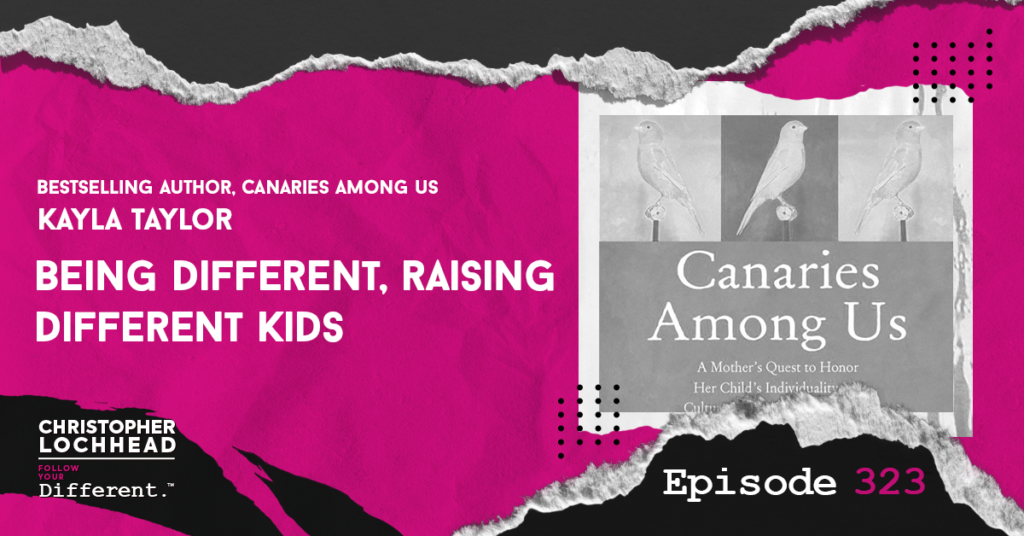
Podcast: Play in new window | Download (Duration: 1:21:10 — 55.7MB) | Embed
Subscribe: Apple Podcasts | Spotify | Pandora | RSS | More
The most powerful thing you can be is 100% yourself, and specifically be the things that make you different, yet uniquely you. But we live in a world that values sameness that drives conformity, that lack of openness to different can cause significant problems for adults, and even more so for kids. We discuss all these and more with our guest, Kayla Taylor.
Kayla Taylor is the author of Canaries Among Us, a Mother’s quest to honor her child’s individuality in a culture determined to negate it. If you’re different, you love someone who’s different, or have a child in your life who’s different. You’re going to love this conversation with Kayla.
Pay special attention to the part of this dialogue about how we’re all grappling with being caring and sensitive to the needs of others and on the other hand, not being so overly careful that we can’t say anything to anybody about anything for fear of being criticized or canceled.
You’re listening to Christopher Lochhead: Follow Your Different. We are the real dialogue podcast for people with a different mind. So get your mind in a different place, and hey ho, let’s go.
Kayla Taylor on receiving appreciation for her work
Kayla expresses gratitude for when people give their time and validation of her work. She describes her book as a vulnerable endeavor and admits to considering not publishing it multiple times. She recalls expecting critical reviews, which almost led her to give up. However, a positive review convinced her to continue.
Kayla feels a sense of obligation to address the stigmatized issues covered in her book and support others who may be going through similar experiences. She acknowledges that while others have written about similar topics, they often reflect on childhood experiences or feel restricted by privacy concerns. She believes there is a lack of literature capturing the current challenges of raising children with learning differences who face bullying, and she wants to fill that gap and offer support to others in similar situations.
Kayla Taylor on writing under a pseudonym
When asked as to why she wrote under a pseudonym, Kayla explains that she couldn’t find a memoir from a parent in the midst of dealing with issues such as bullying, learning differences, and anxiety. She desired a book that captured the present moment and felt poignant.
However, she also wanted to respect her children’s privacy and avoid publicly shaming individuals, including the children who behaved poorly. She believed that all children should have the opportunity to learn from their mistakes and grow without enduring public shaming. To protect people’s privacy, avoid shame, and honor her own principles, she chose to write under a pseudonym.
Additionally, through her research on different forms of victimization, Kayla discovered that society often fails to support and center those who have been victimized. She didn’t want to contradict her belief in prioritizing victims’ privacy and autonomy by publishing a book that would potentially expose everyone involved. Thus, she decided to use a pseudonym to maintain consistency.
Understanding Learning Differences
Kayla discusses her journey into understanding learning differences when her child faced bullying for being unique and different. Through research, she discovered that one in five people have diagnosable learning differences, including dyslexia and ADHD. However, this statistic doesn’t account for other factors such as sensory processing, mental health issues, and physical impairments that affect learning. She criticizes the education system for being designed during the Second Industrial Revolution, focusing on standardization and neglecting individual strengths.
Christopher shares his own experience of having multiple discernible learning differences and emphasizes that being radically different left him with no choice but to embrace his uniqueness. Despite not having a GED, he became the head of marketing at a publicly traded software company.
Kayla acknowledges that many successful individuals, including Albert Einstein, dropped out of school or struggled within the rigid system. She highlights famous scientists and CEOs who are believed to have learning differences, such as dyslexia and autism spectrum traits, to challenge the notion that such differences hinder capability. The conversation emphasizes the need to recognize and value individuals for who they are rather than conforming to a rigid educational system.
To hear more from Kayla Taylor and how being unique in a world of sameness is actually a good thing, download and listen to this episode.
Bio
About Kayla Taylor
Kayla Taylor writes to address important issues plaguing families, and she uses a pseudonym to protect the identities of minors and other vulnerable individuals.
She supports organizations that promote mental health, neurodiversity, and bullying prevention.
Links
Connect with Kayla Taylor!
We hope you enjoyed this episode of Christopher Lochhead: Follow Your Different™! Christopher loves hearing from his listeners. Feel free to email him, connect on Facebook, Twitter, Instagram, and subscribe on iTunes!
322 How To Build A Legendary B2C Product, Company & Category with Matthew Bertulli Co-founder & CEO of Lomi
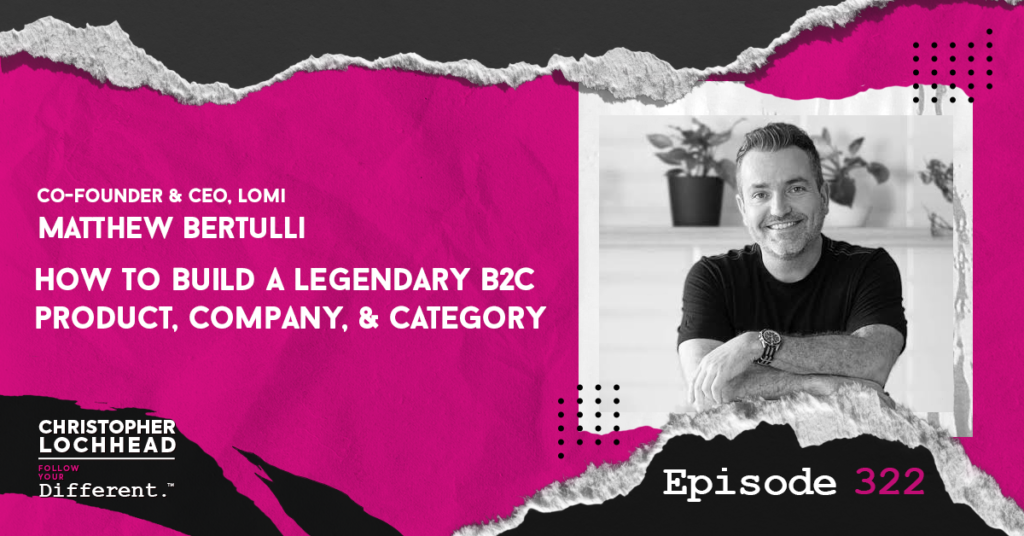
Podcast: Play in new window | Download (Duration: 56:10 — 38.6MB) | Embed
Subscribe: Apple Podcasts | Spotify | Pandora | RSS | More
In this episode of Christopher Lochhead: Follow Your Different, we learn how to build a legendary B2C category and company from one of the hottest founders in a brand new category space, Matthew Bertulli.
Matthew Bertulli is a true mission driven founder, and this is a masterclass on how to be a missionary category designer who evangelizes their category and believes entrepreneurs can do what governments can’t.
Lomi was introduced to the world with one of the most viral product launch videos in history, and Matt breaks down just how they did it. Trust me, you’re going to come back and listen to this episode multiple times.
You’re listening to Christopher Lochhead: Follow Your Different. We are the real dialogue podcast for people with a different mind. So get your mind in a different place, and hey ho, let’s go.
The Need for Lomi
The conversation starts off about Lomi, and the need for a product infrastructure for composting. Matthew sets up a bit of background by discussing their company, Pela Case, which produces compostable phone cases.
Later on, what they realized is that despite having the push to create compostable and earth-friendly products, there was a lack of compostable infrastructure globally.
They observed that even major companies like Pepsi, P&G, and Unilever were investing in transitioning from single-use plastics to compostable alternatives. However, government regulations banning single-use plastics were in conflict with the lack of compostable infrastructure.
For example, in California, companies offered compostable products, but there was no proper system to handle them. Compostable items were often mistaken for regular waste and ended up in landfills, rendering the whole effort futile.
Matthew Bertulli on going against the “safe”route
Matthew then shares their decision to go against the “safe”advice and pursue this idea for Lomi. Despite having a successful company with millions of customers, they chose to develop a complex product that would compost food in a short time.
The process was difficult and required significant investment. They faced numerous obstacles, particularly with factories initially rejecting the idea or lacking the technological capability to execute it.
However, they eventually found a toy factory willing to support the project. Matthew emphasizes that creating something new and innovative is met with resistance, as manufacturers prefer replicating existing products.
“The hard part with all of this is like, it’s making this kind of product or any kind of product like this. It’s hard tech, which makes it expensive. It makes it slow. It took years to develop.”
– Matthew Bertulli
Standing up against the Board
The conversation then moves toward the entrepreneurial mindset and the personal motivation behind pursuing a business idea. Matthew explains that having control over the board and ownership in the business allowed them to make bold decisions.
For them, their drive stemmed from a strong dislike for food waste, particularly due to personal experiences with inefficient waste disposal methods. They believed that finding a better solution would resonate with others who shared the inconvenience.
Matthew was highly convinced that the idea would work and could successfully sell it to the board and the team. They also highlighted the positive impact on climate change, which further motivated people to support the idea. Despite having some failed ideas in the past, the trust and confidence from the board and investors helped them move forward.
The result of their efforts was the successful introduction of Lomi, a new kitchen product that has experienced rapid growth and is considered one of the most significant additions to the kitchen product category in over a decade.
To hear more from Matthew Bertulli and the success story of Lomi, download and listen to this episode.
Bio
Matthew Bertulli
Co-founder and CEO of Pela Case & Lomi.
We are a certified B-corp, have Jay-Z’s Marcy Venture Projects as a notable investor, were named Top 10 in the Canadian Business Growth 500 ranking and are #1 in Deloitte’s Fast 50 for cleantech businesses in Canada.
Links
Connect with Matthew Bertulli!
Lomi | Matthew’s Website | LinkedIn
We hope you enjoyed this episode of Christopher Lochhead: Follow Your Different™! Christopher loves hearing from his listeners. Feel free to email him, connect on Facebook, Twitter, Instagram, and subscribe on iTunes!

